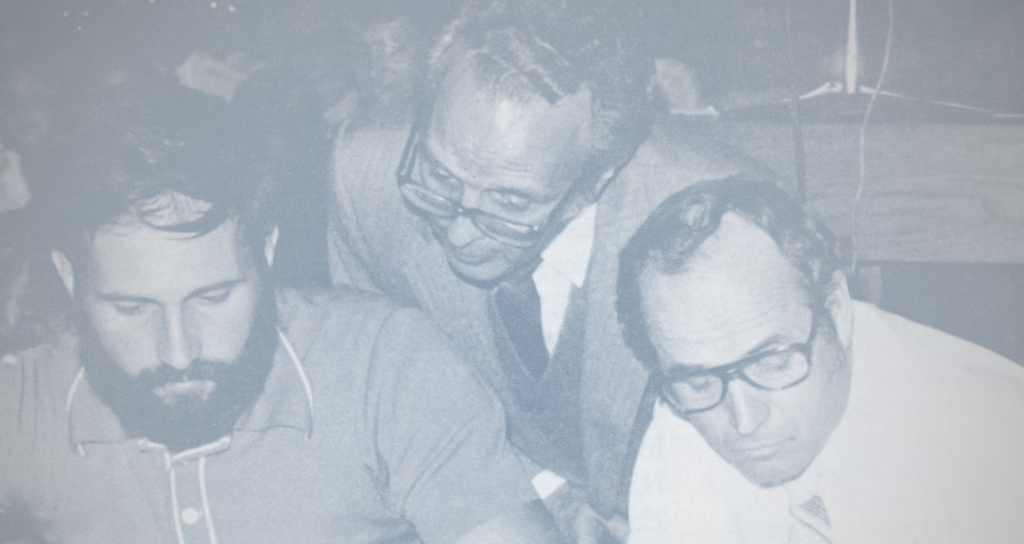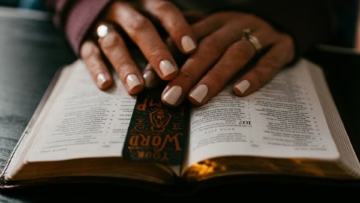
For decades, Bible Quizzing was a pillar of youth ministry for the BIC. Groups of teenagers studied vast passages of scriptures together, preparing to go up against teams from other churches in regional, national, and even world competitions. In this article by Ken Letner first published in the Evangelical Visitor in 1982, quizmaster Charlie Crider took a turn answering questions as he reflects on the program and how it helped BIC youth grow closer to Christ.
The archival photos featured in this article are dated from 1958-1986, some of which intersect Crider’s time as quizmaster.
Charles Crider was born in Kansas and attended Messiah College, beginning in 1942. Charlie is presently serving as Atlantic Conference quizmaster. He and his family attend the Lancaster Brethren in Christ Church.
How long have you been involved with quizzing? Where did it begin?
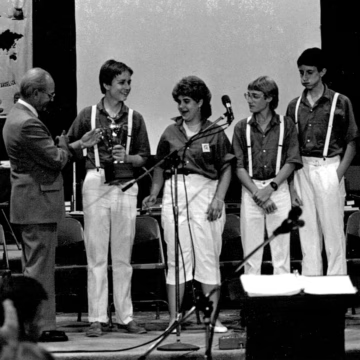
I’ve been in quizzing 13 years and have coached for 11 years. I retired from school teaching in June, 1979 with the idea of devoting more time to the church, perhaps in some type of voluntary service. My wife, Pat, and I went to the missions office in Elizabethtown to check into various possibilities. It was at this same time I was asked to be regional quizmaster. I felt as if this opportunity to serve young people was an answer to prayer. I felt that there was much that could be done in this area.
I have been involved in quizzing since 1968 when Pat and I worked with Ruth Dourte at the church on Caroline Street. Ruth gave us a real background in quizzing for the first couple of years. My wife has been a continuing support to my years in quizzing.
Why has quizzing been so stimulating to you?
There is no other program in the Brethren in Christ Church that affords the opportunity for youth of various churches to get together and to learn to know each other on a personal basis as well as Bible quizzing. This past summer I had the opportunity to coach a team made up of quizzers from four different churches. They blended together as one unit in no time at all because they had known each other so well through several years of quizzing. To get together in the ‘body’ of the church for such a noble purpose as to study the Word of God is enough to stimulate anyone.
How have you seen quizzing affect the lives of young men and women?
I could give many examples of quizzing affecting the lives of young men and women. I could name scores of young quizzers who have turned toward the church, changed their lifestyles, gone into the ministry or mission work, or been a strong force in their local churches. However, I would like to make clear that I feel there are many programs of the church that can point to similar experiences. I just thank the Lord for what he has done through quizzing as well as other programs of the church. We are all doing what we are doing for the glory of God. We are all working together.
Should quizzing be a part of every church’s youth program?
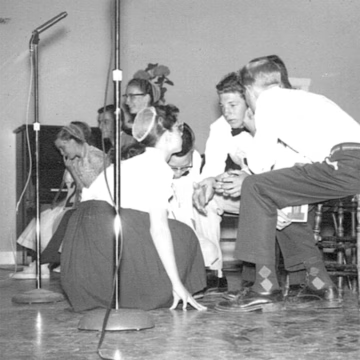
I’d naturally feel that would be an asset. In order to have an effective Bible quiz program, there need to be dedicated leaders, and without those dedicated leaders it would likely be unsuccessful. When I look at the churches in the Atlantic Conference, I find that every church with a Bible quiz program has it because someone in the church was willing to sacrifice much of their time to that program. We are living in a busy world, and young people have to decide whether they are willing to give their time to a program of Bible study at the expense of other activities. There is no doubt in my mind that they would find it rewarding and enjoyable and worthwhile. Yes, I think every church should consider seriously the possibility of quizzing as a part of their youth program.
I think it is possible to have a good, sound Bible study program that, in fact, could possibly be more effective than Bible quizzing. I think that possibility exists. Probably larger churches might be able to have several types of programs; smaller churches, less. I’m ‘gung-ho’ quizzing, but I’m not ‘gung-ho’ quizzing at the expense of other things. I think of one year the Upland congregation had a musical group. They put a lot of time in that and a trip was involved. I think there was a lot of benefit in that as well.
What does it take to be a good quizzer? To be a good coach?
Commitment! Of course, we do need to accept the fact that there are varying abilities and that not everyone is going to be a good quizzer. Beyond that, it takes real commitment.
To say what makes a good coach, I need only to look at our coaches in the Brethren in Christ Church. First, they need a love for God and his Word. Second, they need a genuine deep love for youth. Third, they need to be sold on Bible quizzing. We have to think that Bible quizzing is really something that will benefit all the youth of the church that are involved in that program—to help turn them in the right direction. If coaches have these three and are willing to commit themselves to their youth, they’ll have great results. That doesn’t necessarily mean they will be a winning team. It means that they will see results in the lives of the young people they coach! That’s really what a winning team is—one that blends together and is drawn closer to Christ in their walk in life.
How did you prepare a team for competition?
I’m sure every coach uses different methods very successfully. The important thing is to help quizzers believe in themselves, believing that they will do the very best they can, and whether they win or lose, they are still tops in your mind. They should always be made to appreciate any quizzer or team that can beat them. That person needs to be admired for being what he or she is! Always expect to win, but always be prepared to lose. It’s easier to be a good winner than a good loser, but it is more important to be a good loser.
What were some of the more exciting competitions you coached in?
So many! Of course there were many on the Regional level, but probably the ones that stand out most in my mind would be Nationals and Worlds—finals with Nappanee in 1969, with Mt. Rock in 1970, with Canada in 1972, and with Grantham in 1976. One of my most exciting was a three-way quiz at Worlds in 1977 in which we beat two all-star teams to finish in fourth place. Of the three finals at Nationals, the 1976 final stands out, because we had one of our better teams and Grantham had one of their better teams. The feeling before going into the finals was just like Esther Zook of Grantham put it, “I feel so good because I know no matter who wins we will still love each and will still be good friends.” That makes for an exciting time together.
What are some of life’s lessons you’ve learned through your quizzing experience?
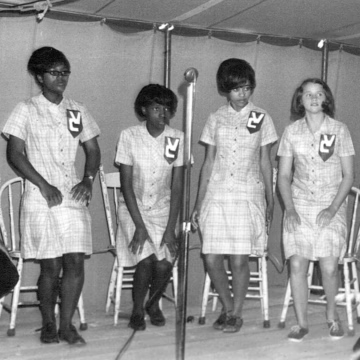
One lesson I’ve learned in quizzing is to always try to win as fairly as possible and always show respect for the teams that lose, for tomorrow it might be you! For years I would do anything to win a quiz—like jump just to cut the other team out of a chance to get the question and win the quiz. One year at the Grantham Tournament, when we entered two teams, our second team did just that to the team I was coaching. I realized that was a result of my coaching. Now, though I’d always have my team jump sharp, I’d have them avoid jumping just to cut the other team out—always give an honest try at getting the questions. Also, I never favor my teams siding with one of the other conference teams, especially in Regionals, but also in Nationals. I suggest that they cheer for the person who gets the answer, no matter what team that person is on. I’ve seen too many cases where other teams ran to the winning team because they were for them, and the losing team was the one that was ignored. We’re all brothers and sisters—win or lose!
What was one of the most encouraging times for you in quizzing?
The many affirmations that I have received from the coaches and quizzers of the Atlantic Conference have been encouraging. They have been terrific! Even when I have goofed, they’ve been very supportive. There have been so many rewarding times involving the teams I have coached that it is hard to point any one of them out. I suppose one would be to see one of my quizzers who had been beaten out of a jump by an opposing quizzer (that knocked us out of the finals) go to that opposing quizzer, throw her arms around her and say, “Great jump!” That takes a great person.
You have been an inspiration to many over the years in quizzing—quizzers and coaches alike—from whom have you gained your inspiration?
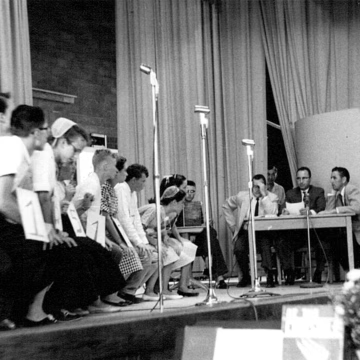
If I were to name the people I’ve received my inspiration in quizzing from, I’m afraid I’d leave someone out. I will attempt to name a special few. Ruth Dourte who taught me many values in quizzing; Mark Hess, whom I consider the dean Atlantic Conference quizzing; Mahlon Fry who helped me be relaxed as a quiz coach; my wife and children who shared the quizzing experiences with me; and Jake, Bessie and Hannah Lutz (members of the Lancaster Church) who were always there! Of course, I would be remiss not to mention our pastor, Merle Brubaker, whom I have known through quizzing for several years.
You serve as deacon at Lancaster. Has your ministry as deacon been enhanced at all by your quizzing involvements?
I am completing my tenth year as deacon at Lancaster. I feel my involvement in quizzing has made me more sensitive to the youth of our church, and in that way has made me a better deacon than I would have otherwise been.
How have your quizzing involvements affected your family?
All three of our children have been quizzers and my wife has always stuck with me and enjoyed quizzing. In 1970, my two sons were on the team that traveled to California and in 1976, my daughter was on the team that went to California. In addition, we’ve had trips to Canada and Ohio. Actually many of our vacations have been planned around quizzing.
Serving as quizmaster, you have contact with new coaches. How do you help them get started? What good words do you have for them?
As regional quizmaster, I feel I am a servant of the quizzers and their coaches. In this capacity, I am always anxious to meet new coaches and new teams. If someone is new in quizzing, they have many questions about quizzing, and I hope with my fifteen years in quizzing that I will be able to answer most of those questions and pass on as many helps as I can. All I can do is offer to meet with them or their teams and go over what quizzing is all about. It is rewarding when you see them become a part of the program and the quizzers become a part of the ‘body’ of quizzers.
Have you had an underlying goal or purpose throughout your years of quizzing?
My goal in quizzing is to point young people to Jesus Christ, see them get into the Word, and apply the Word in their daily lives. Another goal is to get our youth of the various local congregation to know each other on a personal, first-name basis. In this day we need the strength of fellow Christians to support each other in our Christian walk.
Do you have any closing comments?
I am serving in quizzing. That is a far cry from many people serving in the mission field and in full-time Christian service in other areas. It seems to be where I have been called. I do not hold quizzing above any other form of service. They all have their place in the work to be done here on earth. When you asked if every church should have a quiz program in their church, I should have said, “Should every church have a service program in their church?” “Should every church have a youth musical group in their church?” “Should every church have a Brigade-Pioneer Girl program in their church?” I think each church has to answer that question for themselves as the Lord leads them. Churches with a large youth group might be able to have several of these things. Churches with small youth groups may be able to have less. But whatever they do should be done to the honor and glory of God.
